With today’s former commanders regularly joining the boards of giant military contractors, Danny Sjursen looks in vain for the likes of Smedley Butler, an outspoken anti-imperialist from more than a century ago.
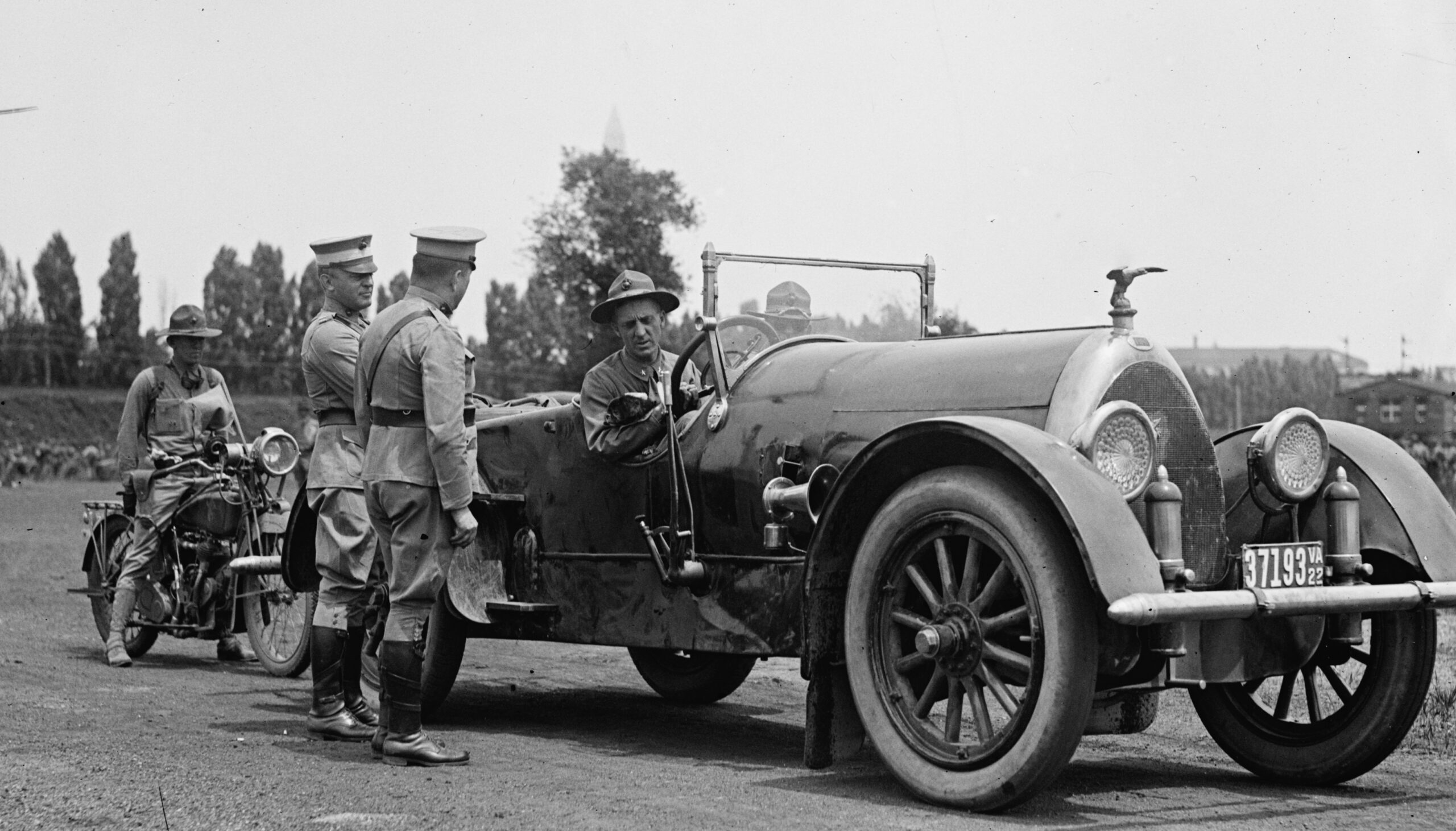
Smedley Butler sitting in car at Gettysburg during a Pickett’s Charge reenactment by Marines in 1922. (Library of Congress, Wikimedia Commons)
By Danny Sjursen
TomDispatch.com
 There once lived an odd little man – 5 feet 9 inches tall and barely 140 pounds sopping wet — who rocked the lecture circuit and the nation itself. For all but a few activist insiders and scholars, U.S. Marine Corps Major General Smedley Darlington Butler is now lost to history. Yet more than a century ago, this strange contradiction of a man would become a national war hero, celebrated in pulp adventure novels, and then, 30 years later, as one of this country’s most prominent antiwar and anti-imperialist dissidents.
There once lived an odd little man – 5 feet 9 inches tall and barely 140 pounds sopping wet — who rocked the lecture circuit and the nation itself. For all but a few activist insiders and scholars, U.S. Marine Corps Major General Smedley Darlington Butler is now lost to history. Yet more than a century ago, this strange contradiction of a man would become a national war hero, celebrated in pulp adventure novels, and then, 30 years later, as one of this country’s most prominent antiwar and anti-imperialist dissidents.
Raised in West Chester, Pennsylvania, and educated in Quaker (pacifist) schools, the son of an influential congressman, he would end up serving in nearly all of America’s “Banana Wars” from 1898 to 1931. Wounded in combat and a rare recipient of two Congressional Medals of Honor, he would retire as the youngest, most decorated major general in the Marines.
A teenage officer and a certified hero during an international intervention in the Chinese Boxer Rebellion of 1900, he would later become a constabulary leader of the Haitian gendarme, the police chief of Philadelphia (while on an approved absence from the military), and a proponent of Marine Corps football. In more standard fashion, he would serve in battle as well as in what might today be labeled peacekeeping, counterinsurgency, and advise-and-assist missions in Cuba, China, the Philippines, Panama, Nicaragua, Mexico, Haiti, France, and China (again). While he showed early signs of skepticism about some of those imperial campaigns or, as they were sardonically called by critics at the time, “Dollar Diplomacy” operations — that is, military campaigns waged on behalf of U.S. corporate business interests — until he retired he remained the prototypical loyal Marine.
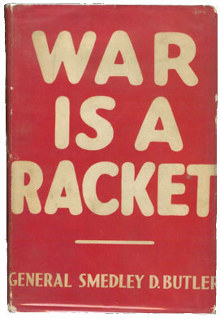 But after retirement, Smedley Butler changed his tune. He began to blast the imperialist foreign policy and interventionist bullying in which he’d only recently played such a prominent part. Eventually, in 1935 during the Great Depression, in what became a classic passage in his memoir, which he titled “War Is a Racket,” he wrote: “I spent thirty-three years and four months in active military service… And during that period, I spent most of my time being a high class muscle-man for Big Business, for Wall Street, and for the Bankers.”
But after retirement, Smedley Butler changed his tune. He began to blast the imperialist foreign policy and interventionist bullying in which he’d only recently played such a prominent part. Eventually, in 1935 during the Great Depression, in what became a classic passage in his memoir, which he titled “War Is a Racket,” he wrote: “I spent thirty-three years and four months in active military service… And during that period, I spent most of my time being a high class muscle-man for Big Business, for Wall Street, and for the Bankers.”
Seemingly overnight, the famous war hero transformed himself into an equally acclaimed antiwar speaker and activist in a politically turbulent era. Those were, admittedly, uncommonly anti-interventionist years, in which veterans and politicians alike promoted what (for America, at least) had been fringe ideas. This was, after all, the height of what later pro-war interventionists would pejoratively label American “isolationism.”
Nonetheless, Butler was unique (for that moment and certainly for our own) in his unapologetic amenability to left-wing domestic politics and materialist critiques of American militarism. In the last years of his life, he would face increasing criticism from his former admirer, President Franklin D. Roosevelt, the military establishment, and the interventionist press. This was particularly true after Adolf Hitler’s Nazi Germany invaded Poland and later France. Given the severity of the Nazi threat to mankind, hindsight undoubtedly proved Butler’s virulent opposition to U.S. intervention in World War II wrong.
Nevertheless, the long-term erasure of his decade of antiwar and anti-imperialist activism and the assumption that all his assertions were irrelevant has proven historically deeply misguided. In the wake of America’s brief but bloody entry into the First World War, the skepticism of Butler (and a significant part of an entire generation of veterans) about intervention in a new European bloodbath should have been understandable. Above all, however, his critique of American militarism of an earlier imperial era in the Pacific and in Latin America remains prescient and all too timely today, especially coming as it did from one of the most decorated and high-ranking general officers of his time. (In the era of the never-ending war on terror, such a phenomenon is quite literally inconceivable.)
Smedley Butler’s Marine Corps and the military of his day was, in certain ways, a different sort of organization than today’s highly professionalized armed forces. History rarely repeats itself, not in a literal sense anyway. Still, there are some disturbing similarities between the careers of Butler and today’s generation of forever-war fighters. All of them served repeated tours of duty in (mostly) unsanctioned wars around the world. Butler’s conflicts may have stretched west from Haiti across the oceans to China, whereas today’s generals mostly lead missions from West Africa east to Central Asia, but both sets of conflicts seemed perpetual in their day and were motivated by barely concealed economic and imperial interests.
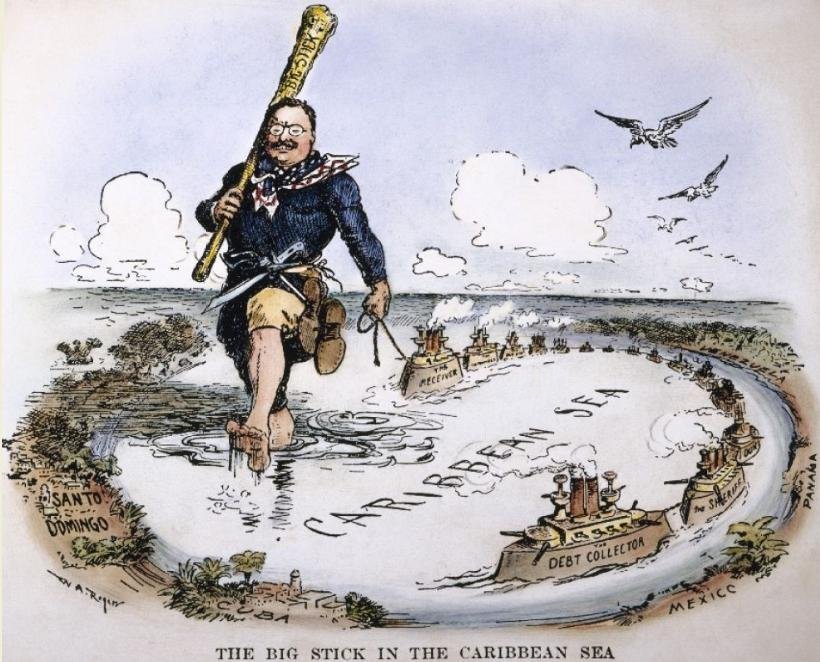
William Allen Rogers 1903 cartoon depicting Theodore Roosevelt’s Big Stick ideology. (Wikimedia Commons)
Nonetheless, whereas this country’s imperial campaigns of the first third of the 20thcentury generated a Smedley Butler, the hyper-interventionism of the first decades of this century hasn’t produced a single even faintly comparable figure. Not one. Zero. Zilch. Why that is matters and illustrates much about the U.S. military establishment and contemporary national culture, none of it particularly encouraging.
Why No Antiwar Generals
When Smedley Butler retired in 1931, he was one of three Marine Corps major generals holding a rank just below that of only the Marine commandant and the Army chief of staff. Today, with about 900 generals and admirals currently serving on active duty, including 24 major generals in the Marine Corps alone, and with scores of flag officers retiring annually, not a single one has offered genuine public opposition to almost 19 years’ worth of ill-advised, remarkably unsuccessful American wars. As for the most senior officers, the 40 four-star generals and admirals whose vocal antimilitarism might make the biggest splash, there are more of them today than there were even at the height of the Vietnam War, although the active military is now about half the size it was then. Adulated as many of them may be, however, not one qualifies as a public critic of today’s failing wars.
Instead, the principal patriotic dissent against those terror wars has come from retired colonels, lieutenant colonels, and occasionally more junior officers (like me), as well as enlisted service members. Not that there are many of us to speak of either. I consider it disturbing (and so should you) that I personally know just about every one of the retired military figures who has spoken out against America’s forever wars.
The big three are Secretary of State Colin Powell’s former chief of staff, retired Colonel Lawrence Wilkerson; Vietnam veteran and onetime West Point history instructor, retired Colonel Andrew Bacevich; and Iraq veteran and Afghan War whistleblower, retired Lieutenant Colonel Danny Davis. All three have proven to be genuine public servants, poignant voices, and — on some level — cherished personal mentors. For better or worse, however, none carries the potential clout of a retired senior theater commander or prominent four-star general offering the same critiques.
Something must account for veteran dissenters topping out at the level of colonel. Obviously, there are personal reasons why individual officers chose early retirement or didn’t make general or admiral. Still, the system for selecting flag officers should raise at least a few questions when it comes to the lack of antiwar voices among retired commanders. In fact, a selection committee of top generals and admirals is appointed each year to choose the next colonels to earn their first star. And perhaps you won’t be surprised to learn that, according to numerous reports, “the members of this board are inclined, if not explicitly motivated, to seek candidates in their own image — officers whose careers look like theirs.” At a minimal level, such a system is hardly built to foster free thinkers, no less breed potential dissidents.
Consider it an irony of sorts that this system first received criticism in our era of forever wars when General David Petraeus, then commanding the highly publicized “surge” in Iraq, had to leave that theater of war in 2007 to serve as the chair of that selection committee. The reason: he wanted to ensure that a twice passed-over colonel, a protégé of his — future Trump National Security Advisor H.R. McMaster — earned his star.
Mainstream national security analysts reported on this affair at the time as if it were a major scandal, since most of them were convinced that Petraeus and his vaunted counterinsurgency or “COINdinista“ protégés and their “new“ war-fighting doctrine had the magic touch that would turn around the failing wars in Iraq and Afghanistan. In fact, Petraeus tried to apply those very tactics twice — once in each country — as did acolytes of his later, and you know the results of that.
But here’s the point: it took an 11th-hour intervention by America’s most acclaimed general of that moment to get new stars handed out to prominent colonels who had, until then, been stonewalled by Cold War-bred flag officers because they were promoting different (but also strangely familiar) tactics in this country’s wars. Imagine, then, how likely it would be for such a leadership system to produce genuine dissenters with stars of any serious sort, no less a crew of future Smedley Butlers.
At the roots of this system lay the obsession of the American officer corps with “professionalization“ after the Vietnam War debacle. This first manifested itself in a decision to ditch the citizen-soldier tradition, end the draft, and create an “all-volunteer force.” The elimination of conscription, as predicted by critics at the time, created an ever-growing civil-military divide, even as it increased public apathy regarding America’s wars by erasing whatever “skin in the game“ most citizens had.
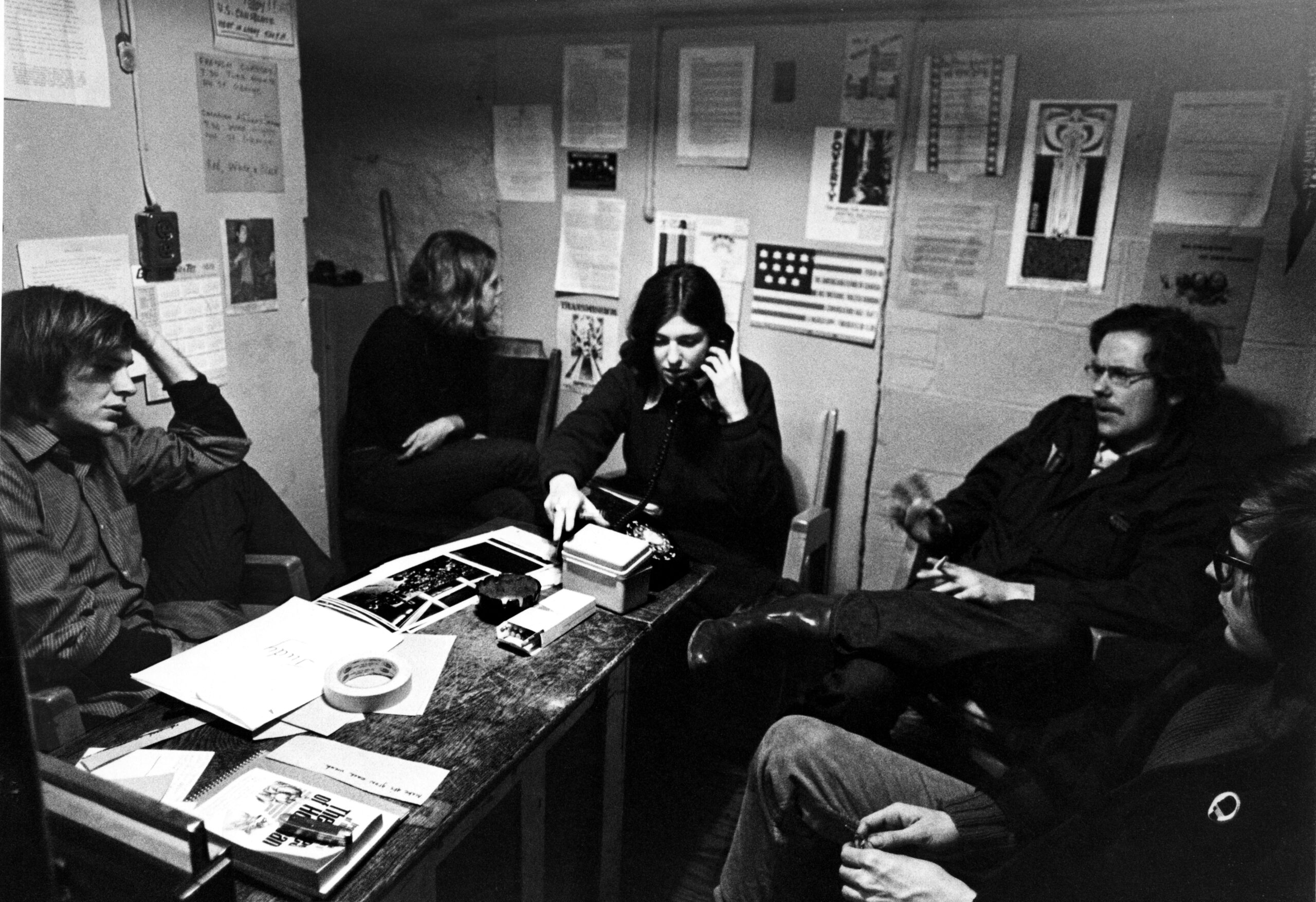
Mark Satin (left), director of the Toronto Anti-Draft Programme, counseling American draft evaders, 1967. (Laura Jones, CC BY-SA 3.0, Wikimedia Commons)
More than just helping to squelch civilian antiwar activism, though, the professionalization of the military, and of the officer corps in particular, ensured that any future Smedley Butlers would be left in the dust (or in retirement at the level of lieutenant colonel or colonel) by a system geared to producing faux warrior-monks. Typical of such figures is current chairman of the Joint Chiefs of Staff Army General Mark Milley. He may speak gruffly and look like a man with a head of his own, but typically he’s turned out to be just another yes-man for another war-power-hungry president.
One group of generals, however, reportedly now does have it out for President Donald Trump — but not because they’re opposed to endless war. Rather, they reportedly think that The Donald doesn’t “listen enough to military advice” on, you know, how to wage war forever and a day.
What Would Smedley Butler Think?
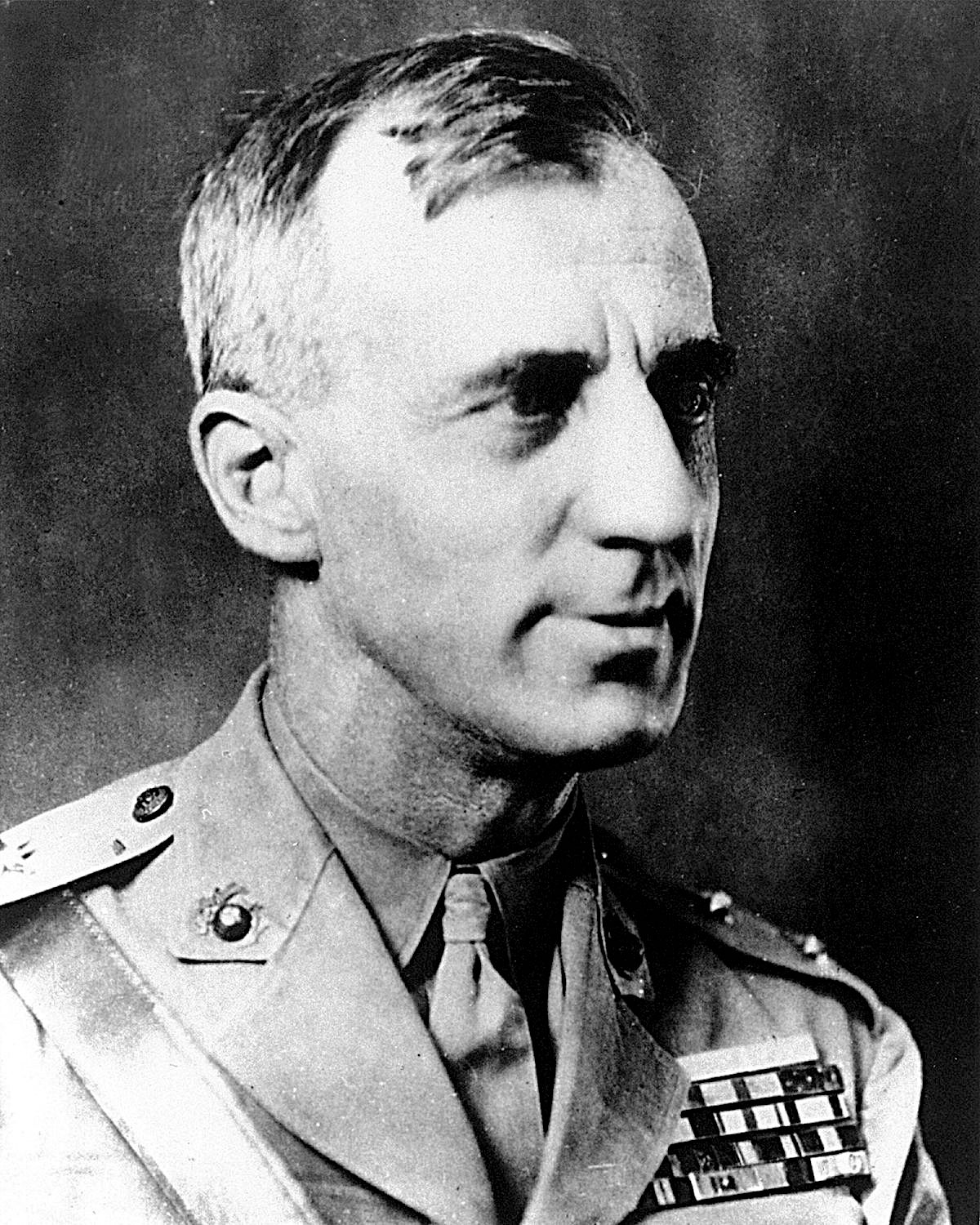
Smedley Butler, circa 1929. (Wikimedia Commons)
In his years of retirement, Smedley Butler regularly focused on the economic component of America’s imperial war policies. He saw clearly that the conflicts he had fought in, the elections he had helped rig, the coups he had supported, and the constabularies he had formed and empowered in faraway lands had all served the interests of U.S. corporate investors. Though less overtly the case today, this still remains a reality in America’s post-9/11 conflicts, even on occasion embarrassingly so (as when the Iraqi ministry of oil was essentially the only public building protected by American troops as looters tore apart the Iraqi capital, Baghdad, in the post-invasion chaos of April 2003). Mostly, however, such influence plays out far more subtly than that, both abroad and here at home where those wars help maintain the record profits of the top weapons makers of the military-industrial complex.
That beast, first identified by President Dwight D. Eisenhower, is now on steroids as American commanders in retirement regularly move directly from the military onto the boards of the giant defense contractors, a reality which only contributes to the dearth of Butlers in the military retiree community. For all the corruption of his time, the Pentagon didn’t yet exist and the path from the military to, say, United Fruit Company, Standard Oil, or other typical corporate giants of that moment had yet to be normalized for retiring generals and admirals. Imagine what Butler would have had to say about the modern phenomenon of the “revolving door” in Washington.
Of course, he served in a very different moment, one in which military funding and troop levels were still contested in Congress. As a longtime critic of capitalist excesses who wrote for leftist publications and supported the Socialist Party candidate in the 1936 presidential elections, Butler would have found today’s nearly trillion-dollar annual defense budgets beyond belief. What the grizzled former Marine long ago identified as a treacherous nexus between warfare and capital “in which the profits are reckoned in dollars and the losses in lives” seems to have reached its natural end point in the 21st century. Case in point: the record (and still rising) “defense” spending of the present moment, including — to please a president — the creation of a whole new military service aimed at the full-scale militarization of space.
Sadly enough, in the age of Trump, as numerous polls demonstrate, the U.S. military is the only public institution Americans still truly trust. Under the circumstances, how useful it would be to have a high-ranking, highly decorated, charismatic retired general in the Butler mold galvanize an apathetic public against those forever wars of ours. Unfortunately, the likelihood of that is practically nil, given the military system of our moment.
Of course, Butler didn’t exactly end his life triumphantly. In late May 1940, having lost 25 pounds due to illness and exhaustion — and demonized as a leftist, isolationist crank but still maintaining a whirlwind speaking schedule — he checked himself into the Philadelphia Navy Yard Hospital for a “rest.” He died there, probably of some sort of cancer, four weeks later. Working himself to death in his 10-year retirement and second career as a born-again antiwar activist, however, might just have constituted the very best service that the two-time Medal of Honor winner could have given the nation he loved to the very end.
Someone of his credibility, character, and candor is needed more than ever today. Unfortunately, this military generation is unlikely to produce such a figure. In retirement, Butler himself boldly confessed that, “like all the members of the military profession, I never had a thought of my own until I left the service. My mental faculties remained in suspended animation while I obeyed the orders of higher-ups. This is typical…”
Today, generals don’t seem to have a thought of their own even in retirement. And more’s the pity…
Danny Sjursen, a TomDispatch regular, is a retired U.S. Army major and former history instructor at West Point. He served tours with reconnaissance units in Iraq and Afghanistan. He has written a memoir of the Iraq War, “Ghost Riders of Baghdad: Soldiers, Civilians, and the Myth of the Surge” and his forthcoming book, “Patriotic Dissent: America in the Age of Endless War,” is available for pre-order. Follow him on Twitter at @SkepticalVet and check out his podcast “Fortress on a Hill.”
This article is from TomDispatch.com.
The views expressed are solely those of the author and may or may not reflect those of Consortium News.
Please Donate to Consortium News.
Before commenting please read Robert Parry’s Comment Policy. Allegations unsupported by facts, gross or misleading factual errors and ad hominem attacks, and abusive or rude language toward other commenters or our writers will not be published. If your comment does not immediately appear, please be patient as it is manually reviewed. For security reasons, please refrain from inserting links in your comments, which should not be longer than 300 words.

Great article! But he left out one very prominent retired officer, Col. Ann Wright. She served in the US Army, eventually retired and joined the State Dept, and was on the team that re-opened the US embassy in Kabul when the US returned to Afghanistan. She resigned in protest during the run-up to the invasion of Iraq, joined Veterans for Peace and Code Pink, and has been a prominent peace activist ever since. She’s been arrested in protests around the world, including on the Flotilla to Gaza in May 2010, where ten peace activists were killed by Israeli commandos. She also participated in “Women Cross the DMZ” in 2015 when 30 women peace activists crossed the DMZ from North to South Korea.
Term limits for military officers. Wouldn’t that astound the Complex. That the USA would actually rely on citizen soldiers to defend the nation. Of course, a Commander in Chief would be required, and the only two available are now being accused of being Russian assets…..it’s a grim scenario.
Hmmm. Here’s the reality. No military commander is going to make peace. Only civilian government leaders do that. WWII, the Japanese generals were about to kidnap the Emperor to prevent him from surrendering. They almost pulled it off but were thwarted at the last moment. So having been rolled up in all their conquests in the Pacific and East Asia AND two nukes wasn’t really enough to get them to stop digging. The Germans and Italians didn’t get a choice. Their countries were completely overrun by Allied armies. It’s tough to wage war when all your armies are prisoners of war.
WWI wasn’t much different. The German army wasn’t actually ready to surrender when the war ended but the German government of the Kaiser wasn’t prepared to continue once the Kaiser was ousted.
A wonderful article. However, as an immigrant with english as a second langauge, I have problem to understand the title. How no retired generals could be against the wars? If the generals are not retired they always advice in favor of the war, not against the war. Can you explain. Thank you.
Gregory Ghica
What was especially damning was Trump, the Draft dodging coward, calling these incompetent Generals & their MIC Lackeys, Dopes & Losers who never win anything, anymore? And right to their faces, not behind their backs! How humiliating to be told that truth from their wonderful POTUS Dictator Leader & having to take the face slapping insults & tauts & none of them having the guts to call Trump out for his belittling tantrums & rants? What Trump fails to understand is that winning is not the end goal here but endless wars & War profiteering is the real objective as Butler noted that War is a Racket? That’s why these Generals have never spoken out? They are part of the problem & they are just as greedy & cowardly as Trump is, in their silence to condemn their death cult MIC which is nothing but a murderous business model to profit from death & destruction!
Be aware that the Warhawk behavior didn’t start with Trump. Obama expanded our wars, and Trump has a compliant House and Senate. Trump, being arrogant and ignorant has the cabinet that reflects his inadequacies, and an intelligence service that doesn’t care who’s in office, as long as the intelligence service is in command.
Trump is only a symptom, and a convenient target for the deluded “party loyalists”.
Many of the U.S. soldiers who fought in the Great War called themselves the lost generation in the anti-imperialist decades. This is because revisionists debunked the lies about German atrocities, which the Allies created in order to justify that terrible conflict. Fear of Germany’s powerful economy is why the vastly stronger British and French empires fought Germany twice and finally succeeded in dismembering and neutralizing her.
In 1919, even after the horrific bloodletting of the Great War, French premier Clemenceau lamented that there were still “twenty million Germans too many.” Churchill famously stated that it did not matter whether Germany was ruled by a Hitler or by a Jesuit priest, only that the challenge that her industrious people presented to British global hegemony must be eliminated.
Recall too that the so-called isolationist America First Committee of 1940 was organized to resist FDR’s scheming to draw the United States into conflict with Germany. Its centers were the campuses of Yale and Harvard. The intelligentsia of the generation that had come of age after the debacle of the Great War refused to allow their government to sacrifice their lives as it had their fathers’, in Washington’s relentless drive for global supremacy.
The America Firsters honored the moral principle enunciated by Thomas Jefferson, “You will do what is right, leaving the people of Europe to act their follies and crimes among themselves, while we pursue in good faith the paths of peace and prosperity”.
The “good war” to stop the evil Nazis was in fact the foundation of the state propaganda apparatus and the military-industrial complex that finally did kill our republic, just as the Founders predicted would be the result of “going abroad seeking monsters to destroy.”
Thank you for the truth of ww1 and ww2. I ve always understood what I was taught were lies, but with so much to think about, I have never been able to get to the bottom of it. Destroying economic threats. … It’s so sad really…..truly evil at work , as I m sure there is plenty for everyone.
From my service as a junior officer and observations since, American generals are almost all
1) tall
2) athletic
3) well-spoken
4) adept at maneuvering through the vast bureaucracy of supply and personnel
The correlation of any of these with actual warfighting skill is evidently minimal. Patton or Sherman would have laughed at these clowns.
Well, I vote to Generalize Danny Sjursen as our new Smedley Butler, along with Cols. Wilkerson, Bacevich, and Davis. Thanks for these insights, and especially for your courage to oppose the military tribalism that no longer permits much dissent. As Wm. Binney put it, so many wear “white cowboy hats” in their Hollywood fantasy life, that they cannot afford dissent or even thought, for as H.L. Mencken said “The average man avoids truth as diligently as he avoids arson, regicide, and piracy on the high seas, and for the same reasons: it is dangerous, no good can come of it, and it doesn’t pay.”
Retired generals (and admirals) are just like everyone else in the military industrial complex: feeding at the trough of unlimited funds.
Look at all of the retired generals and admirals appearing on the talk shows talking “authoritatively” about we must continue to keep troops in where ever, we must continue to spend for weapon systems (which do not work).
Look at the retired generals and admirals who head up their own “consulting” firms feeding at the trough.
None of this is likely to change because the money is just too good, too available.
“None of this is likely to change because the money is just too good, too available.”
Or, in other words absolute power corrupts absolutely. And our current monetary system is designed and built to make sure a small group keep a very tight hold of that absolute power
This is a thoughtful and important article by Danny Sjursen.
It did leave out what might be considered an important episode in General Smedley Butker’s saga. Specifically, it was claimed, by Butler and others, that certain businessmen (we might call them business “titans” or even oligarchs) tried to recruit Butler to command a military coup to overthrow the presidency of FDR.
As an aside; consider the current plight of Assange and Manning, who revealed U$ war crimes and other things, compared to the lack of any serious consequences for the alleged conspirators (including Prescott Bush) who planned and intended to take over the U$ government.
I have been reading Sjursen for years and have often wondered if he had ever heard of General Butler, ever read Howard Zinn’s essays or books, or read Stephen Crane’s “Red Badge of Courage”.
I suspect that many, here, have known about Butler for years or even decades.
The reason I have wondered has to do with what the lower ranks in the military think about war, about service, about who and what they serve, as well as how it is that the military is the most respected and trusted “institution” in the U$ (with a wee bit of help from Hollywood, it must be imagined).
Sjursen has said, in earlier articles that, while in high school, he was attracted to the military by the thought of wearing the military dress uniform and how cool (romantic?) that might be. Doubtless, many a young U$ lad and lassie might have the same yearning, as well as the desire to “serve” especially, especially for someone like Tulsi Gabbard, after an “event” like Nine-Eleven.
It is very likely that General Smedley Butler is not mentioned in the U$ History taught most young U$ians in elementary or secondary school, or even at university, as doing so might bring into question certain happy mythologies and tend to tarnish the reputation of the U$ Military or even that of the U$ Military Empire, itself.
Clearly, the motives of soldiers and the motives of the political/military/financial class are very different.
But do the many recognize and understand this difference?
The soldiers, most of them, surely, are led to believe, and do, that they are risking their lives for good and just reason, to help “make a better world.”
“Leaders”, however wage war, putting others at risk, intending to kill and maim, to make war for control, for resources, for corporate profit, for power, personally, and for the system from which THEY and the ELITE (financial and corporate, military, and war profiteers) profit.
The media will always celebrate the empty words of the “leaders” who claim the military and war are about “liberty, justice, and freedom”, as examples of idealism, and humanity. All too soon, historians will make the very same assertions.
And yet another generation will enlist as fodder for the killing machine.
And the many will still believe the idiotic nonsense.
Let us look at the last war proclaimed as “good”.
That would be the one against the people of Afghanistan.
It is said that a group, a relatively small group of individuals from that nation attacked “us” on Nine-Eleven.
So?
What did “we” do?
WE attacked the entire nation of Afghanistan, even though the vast majority of the people, men, women, and children, were innocent of having ANY part in allegedly harming US.
Many U$ians, to this very day think that our behavior was appropriate, was just, was “good”.
That same many have not the slightest idea of what war actually means to those experiencing it, and their ignorance is aided by a media which, beholden TO the War Machine, ensures that the U$ public will never have an honest picture of the carnage, suffering, and ruthless brutality of war. The oligarchs learned that lesson during the war WE waged against the Vietnamese people.
Instead, the media waxes ecstatic about “the beauty of our weapons”, while our schools teach a “history” very different from the learned experience of the soldiers whom we unctuously “thank” for their “service”, even as more and more of them come to question what it was they have done, who or what they have served, and many commit suicide in despair while the generals, the politicians, the war profiteers, and the financial oligarchs are richly rewarded and plan for more wars to be “generational”, never-ending, and very profitable.
“Nevertheless, the long-term erasure of his decade of antiwar and anti-imperialist activism and the assumption that all his assertions were irrelevant has proven historically deeply misguided.’’
Again many thanks Danny Sjursen, you have identified a key problem in the American Military. This is why many of the best officers are eliminated at the rank of Major, because they refuse to get on the train of right thought of upper management, a clear flaw…
I recall a Major early in the Iraq war commenting that “This is not the War that they gamed for…
All part of our now American Tragedy.
Thanks Consortiumnews!
The bush and cheney illegal invasion of Iraq was not blunder, but plunder. It’s all just business. For them, for the military-industrial complex, there is no profit in peace. They are the “merchants of chaos”.
Thank you and may God bless you, Danny.
Every American should read “War is a Racket”, and anyone else who can get their hands on a copy. And the apathy, like you said Danny, will continue ’cause of the almighty dollar.
“War is a Racket” is available as a pdf on several sites online.
“Confessions of an Economic Hitman” is probably more important today.
Oh this is so sad. NO wonder America can’t win anything. The military has seemed to become a depository for military people making decisions about not much—and with little understanding of the people and culture they are attacking—and then these generals go on news shows and discuss—whatever— It seems like the last war that made some sense was WW 2. Outside of getting nice pensions and then becoming lobbyists—this seems to be the chosen career path of many. I just read a book about WW 2 and a reporter whose name I have forgotten , because I was so gobsmacked when I read that he wandered around and went to whatever unit he felt like. He even wrote about soldiers he met and even listed their city , state and street address. He was free to walk around the war and talk to whoever he wanted. Wow. Apparently the press had a lot of freedom in Vietnam too—more than they do now The military trusted the press. then. What has changed to make everything so empty of meaning?
Victory is not the objective; war, chaos, turmoil is the objective. It is all business.
Gordon is correct; it is about power and hegemony, not “winning”- we already won as the world’s permanent military-occupiers. That this insanity does not occur to most Americans is beyond belief.